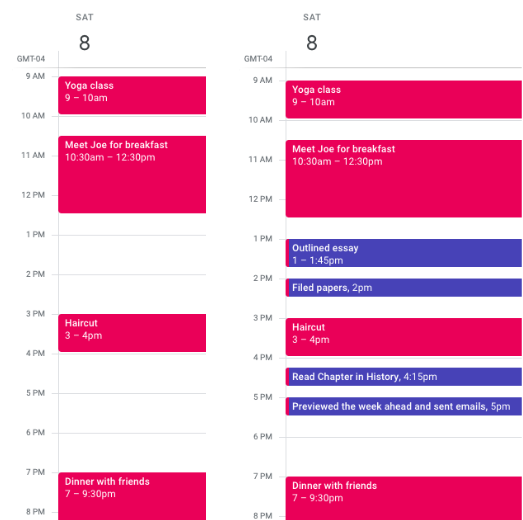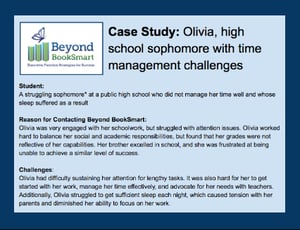Whenever I am working with someone on creating a schedule, I always get asked the same question,  “Should I add activities that are not related to school or work?”
“Should I add activities that are not related to school or work?”
My answer is always a resounding, “Absolutely!”
It helps to consider all the demands on your time, not just the work obligations, when you want to track and manage your daily life.
Incorporating activities that aren’t part of work or academics becomes even more crucial once students enter college or the workforce. When students face longer stretches of unstructured time (between college classes or during a work day), that’s when the true planning, prioritizing, and time management challenges present themselves.
Just think about how unproductive a day off becomes without structure. Before you know it, the day has drawn to a close and you can find yourself wishing that you had accomplished something of importance to you.
When a student asks "How can I feel less overwhelmed?"
During my coaching sessions with a college student, we discussed the importance of scheduling everything into her calendar, including meals. You may wonder, “Who forgets to eat?” Well, it’s easier than you think for some people who become involved in an absorbing activity! In this case, however, it is about figuring out realistic times to schedule work. What good does it do to schedule writing an essay during a time that you will be eating with your friends? This benefits no one and leads to frustration and feelings of failure. Therefore, prior to scheduling work, my college student developed the habit of scheduling social commitments, activities, and meals. The work is scheduled in the remaining time. It no longer needs to be stated that they need to begin a project a week earlier or complete work between classes. The calendar makes it obvious that they have less time to complete a task than they thought.
An accidental discovery
Imagine my delight when I learned from a colleague that this strategy actually is a thing - it's known as the “unschedule”. Of course, this led to a Google search to find out more. The unschedule is a tool described in Neil Fiore’s book, The Now Habit. By scheduling self-care, fixed activities, and guilt-free play first, you essentially “fit in” work in your “free time”.
Nils Salzgeber describes this tool in greater detail in this blog post. He explains the eleven guidelines to using this tool and why it helps with procrastination. In addition to feeling less critical about where your time has gone, the breakthrough idea in using this tool is that completing work begins to feel like a rare commodity - leading you to envision your time as the valuable resource it is.
The unschedule in action
For example, if you took a typical Saturday and "unscheduled' it by putting in all the non-work activities, it might look like the image on the left below. You can see that the gaps between activities are the precious time during which you can do chores, write that essay due Monday, or work on that presentation for your team. Those gaps become opportunities. The image on the right shows how this work is logged onto your calendar after you've spent solid time on those tasks. Now, instead of feeling guilty for procrastinating, you can revel in what you have done - and that success leads to less wasted opportunities to accomplish your goals.

Can the unschedule help the “overscheduled” child or adult?
It sure can! The unschedule helps you visualize how all of your commitments can fit. It also forces you to be realistic about your time. If you plan out your unschedule at least a week in advance, you can see when problems may arise due to scheduling difficulties. This allows for more time to find workable solutions. You may find that you need to switch carpool shifts when you have a doctor’s appointment or start packing your kids’ camp trunks a week earlier.
While reading about all the guidelines involved in an unschedule can feel daunting, starting with scheduling work after everything else can be a simple place to start. Although I have not yet taught the aforementioned college student all eleven guidelines, she is well on her way to unscheduling her life. She is becoming better equipped at managing the various demands on her time, which will most likely increase once she graduates. Additionally, she has developed a system to structure her unstructured time. In many jobs (both office and independent contractor jobs), employees are expected to complete tasks by specific deadlines and are allowed the freedom to structure their own process. The unschedule is a tool that can be used to create this structure, improving productivity and reducing stress.
Photo at top by Tinh Khuong on Unsplash
 Olivia had attention challenges that interfered with her work habits and led to late nights and poor sleep. Read our case study to learn how her coach helped her manage her time more effectively.
Olivia had attention challenges that interfered with her work habits and led to late nights and poor sleep. Read our case study to learn how her coach helped her manage her time more effectively.

